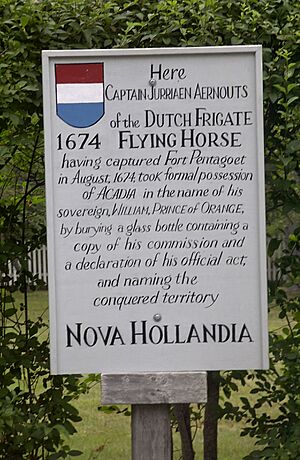Jurriaen Aernoutsz facts for kids

Jurriaen Aernoutsz was a captain in the Dutch navy. He is known for briefly taking control of Acadia, a French colony in North America. During a war, he captured its main fort, Fort Pentagouet, and renamed the area New Holland.
A Captain's Mission
Jurriaen Aernoutsz was the commander of a warship called the Flying Horse. His ship was based in Curaçao, an island in the Caribbean. During the Third Anglo-Dutch War, he was sent to the North Atlantic. His mission was to fight French and English ships. This happened after the Dutch had recaptured New York City.
However, by the time Aernoutsz reached New York, the war between the English and the Dutch had ended. They had signed a peace agreement called the Treaty of Westminster. But the Franco-Dutch War was still happening. This was a war between the Dutch and the French. Aernoutsz then met with a man named John Rhoades. Together, they decided to attack Acadia, which was a French colony.
Taking Control of Acadia
On August 10, 1674, Captain Aernoutsz and his crew attacked Fort Pentagouet. This fort was the capital of Acadia. They captured it in just two hours. After that, he sailed along the coast of the Bay of Fundy. He took supplies and goods from several French settlements. He ended his journey at Fort Jemseg, which he also captured.
Aernoutsz then claimed Acadia for the Dutch. He called it New Holland. To show his claim, he buried bottles at both Fort Pentagouet and Fort Jemseg. He stayed in Acadia for about a month. In mid-September, he returned to Boston. There, he sold the goods he had taken and even sold the cannons from Fort Pentagouet to the government of Massachusetts.
The Aftermath
Aernoutsz went back to Curaçao in October. He left John Rhoades and some others in Boston. He told them to return to Acadia to keep control of the territory. However, once in Acadia, Rhoades and his group started stopping ships from New England. These ships were trading with the Wabanaki Confederacy, a group of Native American tribes.
Because of this, the government of Massachusetts arrested Rhoades and his companions. They were put on trial for being pirates. While they were on trial, the French easily took back control of Acadia. There was no fighting needed.
Dutch Claims and French Control
Even though the French had taken Acadia back, the Dutch still believed it was part of their empire. In 1676, they even named Cornelius Van Steenwyk as the Dutch governor of New Holland. But this was mostly just a title on paper. In reality, the French still controlled the area.
Soon after his appointment, Van Steenwyk sent a Dutch group to try and take back Fort Pentagouet. But three English warships from Boston stopped them. The Dutch continued to claim Acadia on paper until 1678. That year, the war ended, and they gave up their claim to the territory.
|
 | Selma Burke |
 | Pauline Powell Burns |
 | Frederick J. Brown |
 | Robert Blackburn |

